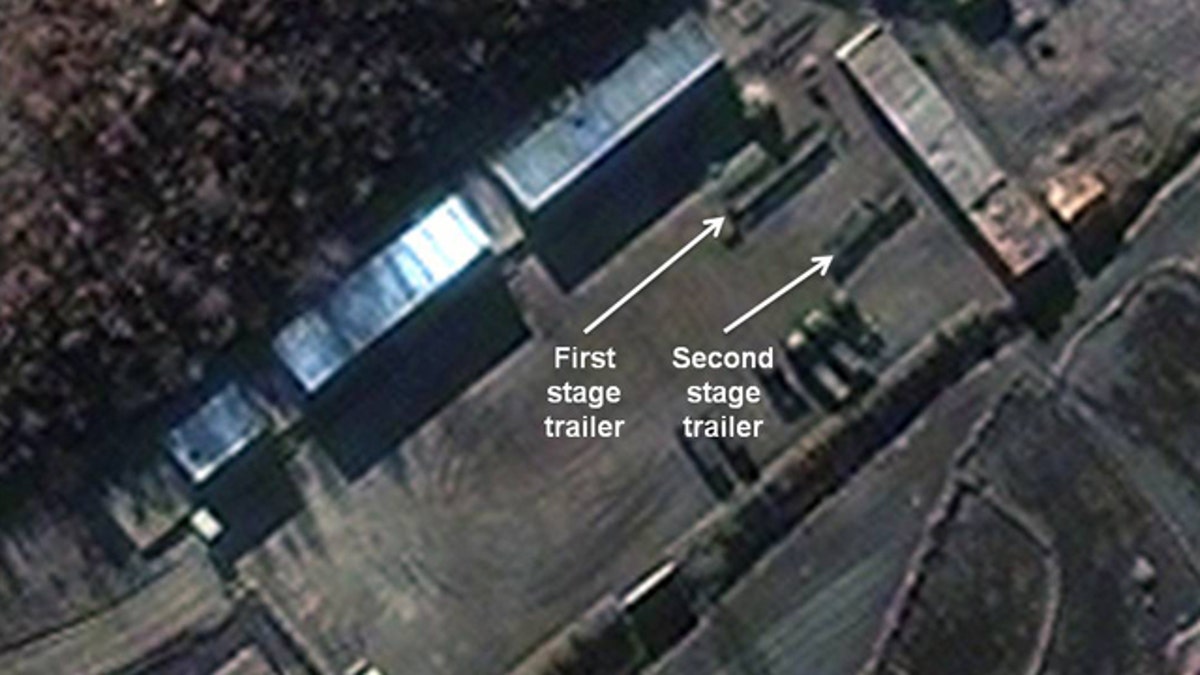
Nov. 26, 2012: A satellite image provided by DigitalGlobe shows the Sohae Satellite Launch Station in Cholsan County, North Pyongan Province, North Korea. (AP)
WASHINGTON – Rocket sections are apparently being trucked into North Korea's northwest launch site, but some analysts are asking whether it's just a calculated bluff meant to jangle the Obama administration and influence South Korean voters ahead of presidential elections in three weeks.
There are questions about whether North Korean scientists have corrected whatever caused the embarrassing crackup of its last rocket shortly after liftoff in April, and whether Pyongyang is willing to risk another failure -- along with U.N. condemnation and more sanctions.
"It's possible, of course, that Pyongyang knows its preparations will be seen and discussed in the West, and they are intended to be a signal rather than signs of an imminent launch," David Wright, a physicist with the Union of Concerned Scientists, wrote on the organization's website this week. "Preparing for a launch less than a year after a failure calls into question whether the North could have analyzed and fixed whatever went wrong."
Before its last two launches, North Korea notified international organizations of its plans to send a satellite into orbit aboard a rocket. Neither the International Maritime Organization nor the International Civil Aviation Organization has responded to requests from The Associated Press for information. But South Korea and analysts say North Korea has yet to provide such notification, something that usually happens weeks in advance.
Even if a launch never comes, the mere preparations could be an attempt to influence the Dec. 19 presidential election in rival South Korea and raise Pyongyang on President Barack Obama's list of foreign policy priorities as he prepares to be inaugurated for his second term in January.
North Korea has repeatedly tried to interfere with South Korean elections, according to government officials and analysts, and there's speculation that Pyongyang's rocket work could be an attempt to raise worries as campaigning heats up.
North Korea presumably prefers the liberal candidate, Moon Jae-in, the argument goes. Another provocation, or simply heightened tensions, could be seen by voters as evidence of a failed North Korea policy by the current conservative leader in Seoul.
Both Moon and the conservative contender, Park Geun-hye, have signaled a softening on North Korea policy. But Moon has suggested a return to an accommodating policy of engagement and aid for Pyongyang that has been missing during the five years of President Lee Myung-bak's rule, which ends in February when his single term expires.
"If indeed a new satellite launch is North Korea's next provocation, it will be an early test of South Korean candidate commitments to reopen dialogue with the North," Scott Snyder, senior fellow for Korea studies at the Council on Foreign Relations, wrote this week.
Pyongyang could also be trying to send a message to Obama following his re-election. Pyongyang has previously staged what Washington and Seoul consider provocations around elections in both the United States and South Korea. North Korea conducted a rocket and nuclear test within months of Obama taking office in early 2009.
Washington worries about North Korean launches because long-range rocket technology can be easily converted into use for missiles that could target the United States.
Analysis of recent satellite images written for 38 North, the website for the U.S.-Korea Institute at Johns Hopkins School of Advanced International Studies, suggests Pyongyang could be ready to launch a three-stage rocket by the end of the first week in December.
The timing of the preparations has some analysts expecting a launch.
North Korea's April rocket firing came during celebrations of the centennial of the birth of national founder Kim Il Sung, current leader Kim Jong Un's grandfather. Pyongyang has declared 2012 a crucial year for its scientific and economic development, and there has been speculation that it could do something extraordinary to mark its conclusion.
Dec. 17 also marks the one-year anniversary of the death of Kim Jong Un's father, Kim Jong Il.
Because North Korea's missile and nuclear programs aren't transparent, said Daniel Pinkston, a North Korea analyst at the International Crisis Group, outsiders cannot determine what went wrong with the April test and what scientists are doing to address the problem.
Any launch attempt raises the specter of failure, Pinkston said, but "they call it rocket science because ... it's hard. Everyone makes mistakes ... but every time you test, you get to go back and work on those problems and fix them."
Baek Seung-joo, an analyst at the state-run Korea Institute for Defense Analyses in South Korea, said past failure could actually be a spur to try again.
"North Korea needs to redeem its embarrassing rocket failure in April," he said.
